Cat Litter Info - all you need to know about cat litter!
Cat litter info? If you thought that cat litter and cat litter trays are just a small part of the essential equipment needed when choosing a cat, you were mistaken.
It is a vital part to your cat's well being. Even if your cat is an outdoor cat that uses the garden you should still provide a cat litter box for use when indoors.
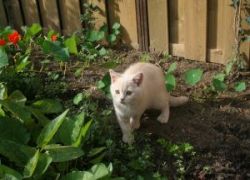
There are different types of cat litter and also different types of litter boxes. Finding the right combination will take a couple of experiments, but in the end it will ensure that your cat is happy with his potty.
Cat Litter Info: Types of cat litter
 Clay
or sand-based litters
Clay
or sand-based litters
This cat litter absorbs moisture effectively and is inexpensive. It does not however absorb odors and can leave heavy tracking when wet. It is also a very heavy litter.
 Silica sand crystals
Silica sand crystals
This type of cat litter basically eliminates all odors and absorbs urine effectively.
It is easy to maintain by just removing the waste daily and then changing the crystals every few weeks. It is non-staining and very light to carry. The silica cat litter is expensive and can be a mess to clean up if it lands on the floor.
 Soil
from your garden
Soil
from your garden
The only two plus points to this is that it is free and readily available. The downside is that soil from your garden can have bugs in and that it will be very messy to clean up.
 Shredded
newspaper
Shredded
newspaper
Shredded newspaper used as cat litter is inexpensive and readily available. Newspaper is however not very absorbent and will not absorb smells.
The ink from the wet newspaper will stain carpets and floors and can be harmful to your cat if he licks his paws after using the litter box.
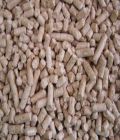 Wood
or paper pellets
Wood
or paper pellets
This kind of litter is non-staining and very absorbent of both smells and moisture. It is unfortunately very expensive.
Scented litter and reusable litterScented litter masks smells but can sometimes be too strong smelling for both you and your cat. The chemicals used to scent the cat litter can be an irritant to your cat's paws.
Reusable litter lasts for a long time and is economical and non-staining. Reusable litter is unfortunately unpleasant to wash and is also non-absorbent.
Cat Litter Info: Litter trays and litter scoops
There are basically two types of litter boxes - uncovered and covered/hooded.
 Uncovered
litter box
Uncovered
litter box
Pick a tray that is big enough for your cat to comfortably squat in.
Also make sure that the tray will be able to hold a decent depth of litter as cats like to cover everything completely without soiling their paws.
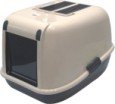 Covered/hooded
litter box
Covered/hooded
litter box
A hooded litter box gives your cat more privacy and can disguise smells more effectively.
Your cat might not like to be enclosed however and will only use an open tray.
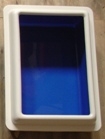 Uncovered
litter box with rim
Uncovered
litter box with rim
This type of uncovered litter box has a rim that can limit the amount of litter that gets spilled outside the litter box. It is exactly the same as other uncovered litter boxes.
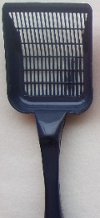 Litter
scoop
Litter
scoop
A cat litter scoop is a handy tool that allows you to sift the cat litter and remove any dry, solid waste.
Cat Litter Info: Cat litter hygiene
- It is very important to maintain proper hygiene when handling a cat's litter box, not only for yourself but also for your cat. The key is to wash your hands (preferably with a hygiene soap) any and every time you handle the litter box.
- Dispose of used litter and waste in newspaper or biodegradable bags. Never flush litter down the toilet as it will cause blockages.
-
 Wash the litter
box itself every time you change litter with a detergent or a solution of bleach
and water to rid it of odors and germs.
Wash the litter
box itself every time you change litter with a detergent or a solution of bleach
and water to rid it of odors and germs.
- Remove solid waste from the litter daily to prevent your cat from soiling other areas. Replace used litter every second day if possible as it might be too wet for your cat to use. Cats really dislike wet paws and it is unhygienic for your cat when licking his paws.
Cat Litter Info: Multi-cat household
If you have more than one cat in your house, you need to provide a litter box per cat to ensure that your cats all keep using the cat litter box.
Also play around with different types of litter in the different trays so that every one of the cats will be happy.
Cat Litter Info: Reasons why your cat might stop using the litter box
If your cat stops using the litter box, there might a number of reasons: Should your cat stop using his litter box, your first step is to have him checked out by a vet as there might be an underlying medical problem, such as a urinary tract infection or a urethral blockage.
Your cat then associates pain with the cat litter box and will stop using it. It might also be that due to the infection, your cat cannot make it to his litter box on time.
The litter box might be dirty or be too wet for your cat to use. Think about it this way - would you like to use a toilet that has not been flushed in a while? Clean out the litter and wash the cat litter box with a detergent and refill with clean litter.
The type of litter that you are using in the cat litter box might be the cause of the problem. It might be that the litter is too rough and it irritates the cat's paws when covering his business. Some scented cat litters might also be irritating for your cat's nose and he might literally be pulling his nose up for his litter box.
If your cat is spraying instead of urinating normally, it could be stress related. Have your cat checked by your vet to rule out an underlying medical problem.
The location of the cat litter box might not be right, for example, if there is a lot of traffic coming and going it might put your cat of using the box, or if a child bothers the cat whilst he is using the box. Cats like privacy on the loo too!
Cat Litter Info: Toxoplasmosis
Pregnant women or women who plan on becoming pregnant should not handle a litter box or clean used litter. There is a single-celled parasite called Toxoplasma gondii that can cause an infection called Toxoplasmosis.
When an unborn fetus is exposed to this parasite it can cause serious birth defects. Babies can be at risk even if their mothers were exposed a while before pregnancy.
Should you be pregnant and need to handle a litter box, wear gloves and ensure that you wash your hands and arms thoroughly after touching it.
Make sure that the litter box is cleaned daily as the parasite can only live for a few days after being excreted.
If you work in the garden, wear gloves so that you don't inadvertently touch cat feces that may be buried.







